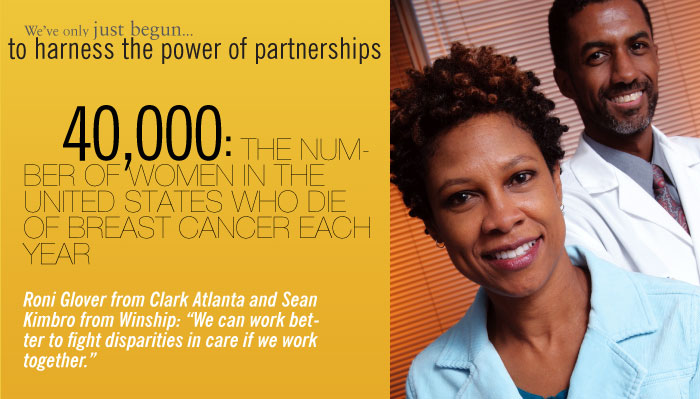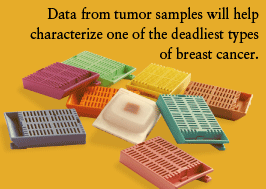 |
A
DISPROPORTIONATE NUMBER OF THE ABOVE TOTAL ARE AFRICAN AMERICAN, AND RONI
GLOVER, A GRADUATE STUDENT AT CLARK ATLANTA UNIVERSITY, IS WORKING WITH
THE WINSHIP CANCER INSTITUTE TO FIND OUT WHY.
“When patients first hear the words
‘you have cancer,’ they are overwhelmed—they don’t
absorb much else that the doctor may be trying to get across during the
rest of the conversation,” says Glover, who is analyzing reasons for
the prolonged time between diagnosis and the beginning of treatment in African
American patients as part of her work for her PhD in health care social
work.
To do her research, Glover
needed access to patients, clinicians, and other social workers in cancer.
Helping her build this network and serving as her mentor is Sean Kimbro,
a molecular biologist recruited to Emory from Clark Atlanta to serve as
program director of the Georgia Center for Health Equality, a coalition
of hospitals and universities led by Winship with a $3.7 million grant from
the National Institutes of Health.
Kimbro’s own research focuses on why
a particularly aggressive form of breast cancer disproportionately affects
young African American women, regardless of issues such as socioeconomic
status or access to care. But he understands the importance of these social
issues in the health care disparities equation. “It was Sean who brought
behavioral scientists on our research team,” says Glover. In addition,
she says, he “pointed out angles I hadn’t thought of”
and connected her with people throughout Winship who could help her.
This scenario repeats itself with other students
at Clark Atlanta and Morehouse School of Medicine, the other two schools,
in addition to Emory and the Grady Health System, involved in the Georgia
Center for Health Equality. The center is dedicated to training minority
graduate students in health-related areas and to counteracting lack of knowledge,
lack of access, and other barriers that lead to disparities in care.
“From my perspective, what’s important
about this center is that it’s bridging the communications gap between
Emory and these other institutions,” says Kimbro. “We can work
better if we work together, and it’s bringing us all together to address
a common cause.” |
 |
| |
|
|
| |
|
|
| |
Fighting
a triple negative |
|
 |
 |
| |
|
|
 |
When doctors analyze breast tumors, they look for obvious vulnerabilities.
If they know which substance(s) make a tumor grow, they can
block these and thus deprive the tumor of what it craves. Some
of the most deadly breast tumors are those that respond to none
of the three more well-known targets (estrogen, progesterone, or HER-2/neu) and therefore to none
of the treatment strategies leveled against them. “Triple-negative”
breast cancer tends to strike younger women, and particularly,
younger African American women. There is precious little
data about the molecular profile of such tumors in this population
and thus little on which to base screening or new targets for
treatment. Winship researcher Mary Jo Lund hopes to change that
by establishing a repository of tumor specimens from all women
newly diagnosed with breast cancer in Fulton and DeKalb counties,
where 20% of all breast cancers in Georgia are diagnosed. Black
female residents of these counties account for 38% of all newly
diagnosed invasive breast cancers, and an inordinately large
proportion of these women are under 50 when diagnosed (42% compared
with 26% of white women). “We hope to use this data to
improve outcomes for all women with breast cancer, particularly
the underserved,” says Lund.
(estrogen, progesterone, or HER-2/neu) and therefore to none
of the treatment strategies leveled against them. “Triple-negative”
breast cancer tends to strike younger women, and particularly,
younger African American women. There is precious little
data about the molecular profile of such tumors in this population
and thus little on which to base screening or new targets for
treatment. Winship researcher Mary Jo Lund hopes to change that
by establishing a repository of tumor specimens from all women
newly diagnosed with breast cancer in Fulton and DeKalb counties,
where 20% of all breast cancers in Georgia are diagnosed. Black
female residents of these counties account for 38% of all newly
diagnosed invasive breast cancers, and an inordinately large
proportion of these women are under 50 when diagnosed (42% compared
with 26% of white women). “We hope to use this data to
improve outcomes for all women with breast cancer, particularly
the underserved,” says Lund. |
 |
| |
|
|
| |
|
|
| |
|
|
 |
|
 |
|
 |
| |
|
|
 |
Harness
the power of partnerships: |
 |
| |
|
|
| |
|
|
 |
>
GATHER MISSING PIECES OF THE PUZZLE. Winship is building a team
of experts in various fields, from nanotechnology to molecular
biology and epidemiology, to tease out genetic differences in
breast tumor samples. A gift of $25,000 can pay for equipment
and technical assistance needed in this effort to help devise
new strategies against one of the most deadly types of tumor,
which is found more frequently in African Americans. |
 |
| |
|
|
| |
|
|
 |
>
EASE THE BURDEN OF CENCER. The Patient and Family Resource Center
at the Winship Cancer Institute provides support for patients
and their families while they are undergoing treatment. Each
family’s needs are as different as each donor’s
ability to give. A $100 gift helps provide snacks for support
groups. Gifts of $1,000 strengthen the center’s emergency
resource fund to pay for prescriptions for patients whose money
has run out. Funding a caregiver’s cancer support group
can be done for only $2,500. And a naming opportunity at $2
million for the center would help the center help more people.
|
 |
| |
|
|
| |
|
|
 |
>
SUPPORT CLINICAL TRIALS. Because of their complexity and size,
these are among the most expensive components of cancer research.
A $100,000 gift can go a long way in helping move a new drug
through the long process to approval. |
 |
| |
|
|
| |
|
|
 |
Send
your gift today by calling 404-727-3518, or give
online. |
 |
| |
|
|
|
|

 (estrogen, progesterone, or HER-2/neu) and therefore to none
of the treatment strategies leveled against them. “Triple-negative”
breast cancer tends to strike younger women, and particularly,
younger African American women. There is precious little
data about the molecular profile of such tumors in this population
and thus little on which to base screening or new targets for
treatment. Winship researcher Mary Jo Lund hopes to change that
by establishing a repository of tumor specimens from all women
newly diagnosed with breast cancer in Fulton and DeKalb counties,
where 20% of all breast cancers in Georgia are diagnosed. Black
female residents of these counties account for 38% of all newly
diagnosed invasive breast cancers, and an inordinately large
proportion of these women are under 50 when diagnosed (42% compared
with 26% of white women). “We hope to use this data to
improve outcomes for all women with breast cancer, particularly
the underserved,” says Lund.
(estrogen, progesterone, or HER-2/neu) and therefore to none
of the treatment strategies leveled against them. “Triple-negative”
breast cancer tends to strike younger women, and particularly,
younger African American women. There is precious little
data about the molecular profile of such tumors in this population
and thus little on which to base screening or new targets for
treatment. Winship researcher Mary Jo Lund hopes to change that
by establishing a repository of tumor specimens from all women
newly diagnosed with breast cancer in Fulton and DeKalb counties,
where 20% of all breast cancers in Georgia are diagnosed. Black
female residents of these counties account for 38% of all newly
diagnosed invasive breast cancers, and an inordinately large
proportion of these women are under 50 when diagnosed (42% compared
with 26% of white women). “We hope to use this data to
improve outcomes for all women with breast cancer, particularly
the underserved,” says Lund. 
